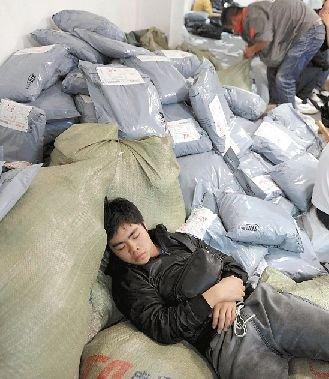Every day at 7 a.m., Xiao Lin, a Shentong Express courier in Hangzhou, packs his electric bike with about 200 parcels, all of which are to be delivered by noon.

Couriers [Flie photo]
After 2 p.m., Xiao Lin's main task becomes receiving parcels. His day doesn't finish until 10 p.m. Since Single's Day (Nov. 11), Xiao Lin had to shorten his lunch break and work longer into the night.
"Usually I ride a dozen times, but now I have to ride 20 to 30 times to deliver all the parcels. Each time I carry only a dozen of parcels for fear that I might lose them."
Xiao Lin's concern is quite understandable. Elsewhere in the city, a courier with YTO Express, Xiao Wang, was inside a building delivering a parcel when 90 undelivered packages were stolen along with his electric bike.
According the company regulations, the courier must pay a penalty of 2,000 yuan (US$313.12) for each lost package after the company receives a client's complaint. For the 90 packages Xiao Wang had lost, his fine could go as high as 180,000 yuan.
There are hundreds of express companies with nearly 10,000 workers in Hangzhou. The incident has caused a stir in the express industry.
Life for these workers, however, are not about to get any easier.
Single's Day this year turned into an online shopping festival. Taobao Mall (Tmall), China's largest online market, secured orders worth 3.36 billion yuan that day. This reflected a changing trend of shopping habits in China's younger generation.
Chairman of the board of Guangdong Shentong Express, Gao Tanggen, said that traditionally speaking, most of the express sector's business comes from factories or trade companies, but now online shopping has claimed 60 percent of the sector's business and is expect to rise.
Wang Xiaorong, deputy-secretary of Zhejiang Express Delivery Association, said the emergence of private express companies was quite legendary, pointing to over 100 express companies in Hangzhou. The most famous private express companies such as Shengtong Express, YTO Express, Zhongtong Express, Huitong Express and Yunda Express were all founded by people from the Tonglu area. In 2010, these five companies had recruited nearly 291,000 employees. Their combined revenue reached 25.6 billion yuan, accounting for half of China's express delivery industry.
According to data collected by China E-commerce Research Centre, the revenue of express companies engaging in online shopping business hit 40 billion yuan in 2010. And this year their revenue is expected to surpass 70 billion yuan.
Most express companies follow a command-chain model of headquarters alliance courier contractor couriers. In its rapid growth, some of the express industry's flaws came to the surface: lax management, paying attention to quantity over quality, and expansions perhaps too fast for their own good. Consumers often complain about lost parcels, frequent delays and bad service attitude from couriers.
As the profits of the headquarters mainly come from the increase of the alliance couriers' delivery orders, alliance couriers gain support for their low price strategy. Low price means low profits, and low profits prevent these courier companies from expanding their business infrastructures and improving the quality of services. A vicious circle is so formed.
In recent years, express companies have all been raising their fees for delivery services. To consumers, the price hike was bad news, but courier companies have little choice. Profit margins continued to decline and fierce competition never stopped. Gao said express companies are now facing more and more pressure due to rising fuel prices and labor costs.
China currently has over 10,000 express companies. While the top three express companies in the U.S. account for 95 percent of the domestic delivery market.
In May, the State Post Bureau passed the Guideline in Express Companies' Mergers and Reorganizations. The guideline aimed to encourage express companies to become bigger and stronger through mergers and reorganizations.
Insiders believed that this guideline heralds the express industry's reshuffle.
Leading into the guideline and perhaps more upcoming changes was one such acquisition. Six months ago, Alibaba Group Holding Ltd CEO Ma Yun and Foxconn founder and Chairman Terry Guo jointly invested US$300 billion in Best Logistics Technology Co., Ltd, which later purchased a 70 percent stake in Huitong Express, one of the top 10 express companies in China.





